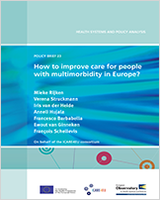NCBI Bookshelf. A service of the National Library of Medicine, National Institutes of Health.
Key messages
- European health systems do not meet the needs of patients with multimorbidity because they are “disease oriented” and organized around single medical specialties which fragments care.
- Fragmented care is associated with contradictory medical advice, over-prescribing, over-hospitalization and poor patient satisfaction.
- Policy-makers can improve care for people with multimorbidity by better integration.
- Making care patient-centred is another way of approaching the fragmentation of care and of increasing patient satisfaction. It requires a clear strategic (and ideally shared) vision.
- Policy-makers can foster both integrated and patient-centred care by:
- Aligning policy, regulatory and financial environments so that they are supportive of integrated care and help make effective care for people with multimorbidity sustainable;
- Developing multidisciplinary guidelines;
- Developing new professional roles (e.g. care coordinator) or functions and assigning explicit responsibility for coordination and links between sectors;
- Implementing individualized care planning (supported by integrated electronic health records);
- Putting in place electronic decision support systems that enable patient-centred care and integrating them with information systems and eHealth applications;
- Adapting privacy and data protection legislation to allow sharing of patient information;
- Investing in training and tools that help care professionals adopt patient-centred approaches (including training in patient-centred communication and multiprofessional and intersectoral teamwork);
- Developing the knowledge and skills of patients and their informal carers and encouraging active participation in decision-making and self-management;
- Promoting collaboration between health care, social care, patient organizations and carers;
- Including patient-relevant outcomes as performance indicators, as well as clinical outcomes, so that providing integrated care becomes part of quality measurement;
- Putting in place payment mechanisms to incentivize patient-centred integrated care.
- The continuous evaluation of innovative practices is needed over the long term to identify effective elements and further strengthen patient-centred integrated care.
Contents
About the Series
This report arises from the Innovating care for people with multiple chronic conditions in Europe (ICARE4EU) project, which has received funding from the European Union (EU), in the framework of the Health Programme. The authors wish to thank all country expert organizations and the programmes that participated in the ICARE4EU project. The authors are grateful to the programme managers for sharing information on their programmes.
The authors and editors are also grateful to Jan de Maeseneer (Ghent University, Belgium) and Nick Fahy (independent consultant), for reviewing this publication and contributing their expertise.
All rights reserved. NIVEL and TU Berlin have granted the European Observatory on Health Systems and Policies permission for the reproduction of this Policy Brief.
Address requests about publications related to the ICARE4EU project to:
NIVEL
Dr. Mieke Rijken
P.O. Box 1568
3500 BN Utrecht
The Netherlands
Email: ln.levin@nekjir.m
The content of this Policy Brief represents the views of the authors only and is their sole responsibility; it cannot be considered to reflect the views of the European Commission and/or the Consumers, Health, Agriculture and Food Executive Agency or any other body of the European Union. The European Commission and the Agency do not accept any responsibility for use that may be made of the information it contains.

This policy brief is one of a new series to meet the needs of policy-makers and health system managers. The aim is to develop key messages to support evidence-informed policy-making and the editors will continue to strengthen the series by working with authors to improve the consideration given to policy options and implementation.
Box
What is a Policy Brief?
- NLM CatalogRelated NLM Catalog Entries
- Review How to strengthen patient-centredness in caring for people with multimorbidity in Europe?[ 2017]Review How to strengthen patient-centredness in caring for people with multimorbidity in Europe?van der Heide I, Snoeijs SP, Boerma WGW, Schellevis FG, Rijken MP, Richardson E, Van Ginneken E. 2017
- Review How to support integration to promote care for people with multimorbidity in Europe?[ 2017]Review How to support integration to promote care for people with multimorbidity in Europe?Hujala A, Taskinen H, Rissanen S, Richardson E, van Ginneken E. 2017
- Review How can skill-mix innovations support the implementation of integrated care for people with chronic conditions and multimorbidity?[ 2022]Review How can skill-mix innovations support the implementation of integrated care for people with chronic conditions and multimorbidity?Winkelmann J, Scarpetti G, Williams GA, Maier CB. 2022
- Sharing clinical decisions for multimorbidity case management using social network and open-source tools.[J Biomed Inform. 2013]Sharing clinical decisions for multimorbidity case management using social network and open-source tools.Martínez-García A, Moreno-Conde A, Jódar-Sánchez F, Leal S, Parra C. J Biomed Inform. 2013 Dec; 46(6):977-84. Epub 2013 Jun 25.
- How has the impact of 'care pathway technologies' on service integration in stroke care been measured and what is the strength of the evidence to support their effectiveness in this respect?[Int J Evid Based Healthc. 2008]How has the impact of 'care pathway technologies' on service integration in stroke care been measured and what is the strength of the evidence to support their effectiveness in this respect?Allen D, Rixson L. Int J Evid Based Healthc. 2008 Mar; 6(1):78-110.
- How to improve care for people with multimorbidity in Europe?How to improve care for people with multimorbidity in Europe?
Your browsing activity is empty.
Activity recording is turned off.
See more...
